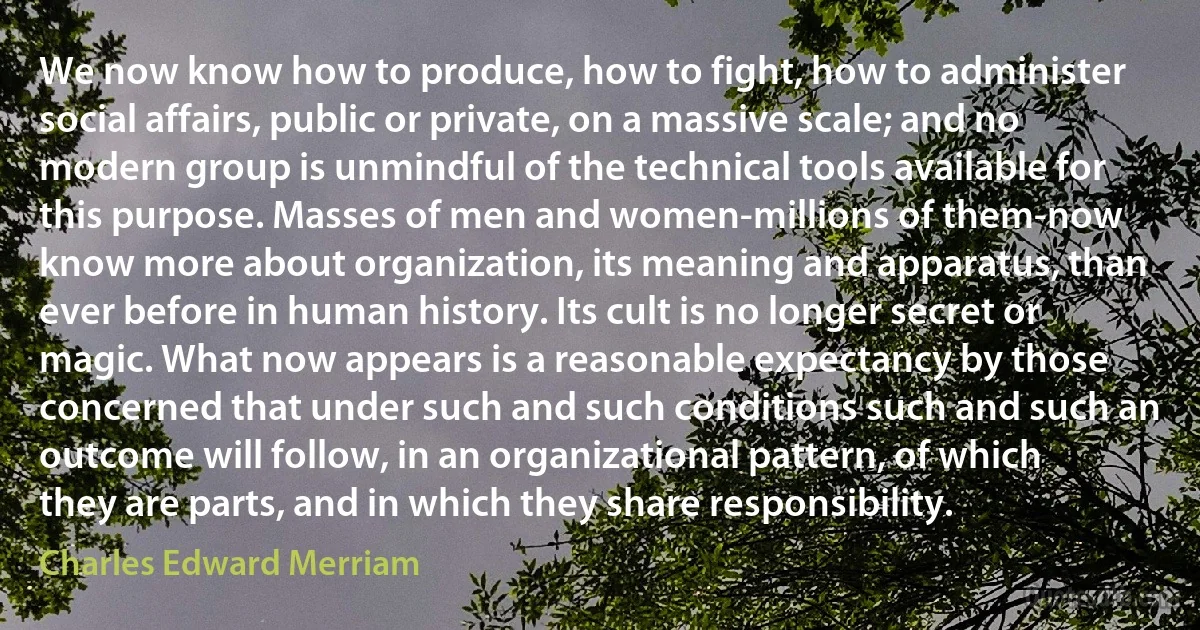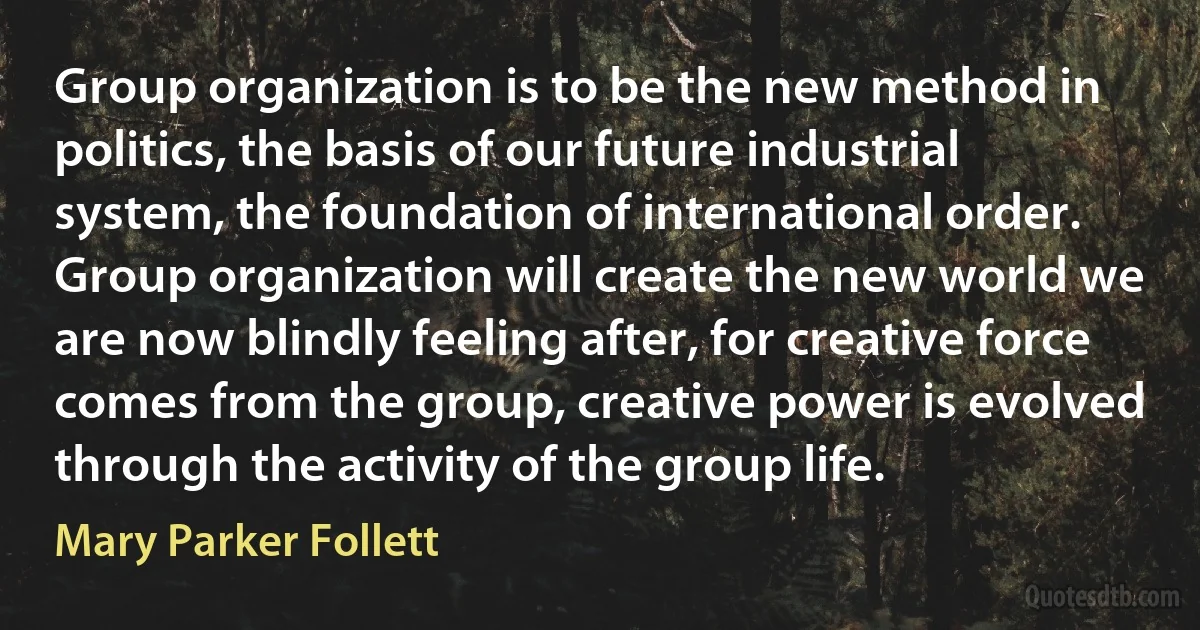Group Quotes - page 52
It is not certain whether Pāṇini used writing for the composition of his work, though it is generally agreed that he knew of a form of writing, based on references to words such as "script" and "scribe" in his Ashtadhyayi. These must have referred to Aramaic or early Kharosthi writing. It is believed by some that a work of such complexity would have been difficult to compile without written notes, though others have argued that he might have composed it with the help of a group of students whose memories served him as 'notepads' (as is typical in Vedic learning). Writing first reappears in India in the form of the Brāhmī script from the 3rd century BC in the Ashokan inscriptions.

Pāṇini
Early psychology was based on the study of the individual; early sociology was based on the study of society. But there is no such thing as the "individual," there is no such thing as "society"; there is only the group and the group-unit - the social individual. Social psychology must begin with an intensive study of the group, of the selective processes which go on within it, the differentiated reactions, the likenesses and unlikenesses, and the spiritual energy which unites them.

Mary Parker Follett
THE subject I have been given for these lectures is The Psychological Foundations of Business Administration, but as it is obvious that we cannot in four papers consider all the contributions which contemporary psychology is making to business administration - to the methods of hiring, promoting and discharging, to the consideration of incentives, the relation of output to motive, to group organization, etc.

Mary Parker Follett
I think the subject of race has been so difficult and so polluted by malign ideas that most people have just left it alone, including geneticists. ... Most genetic variation is neutral – it doesn't do anything for or against the phenotype, and evolution ignores it – so most previous attempts to look at race have concluded that there's little difference between races. I think this position is the one on which the social scientists are basing their position. ... If you look at the genes that do make a difference, selected genes, which are a tiny handful of the whole, you do find a number of differences, not very many, but a number of interesting differences between races as to which genes have been selected. This, of course, makes a lot of sense, because once the human family dispersed from its homeland in Africa, people faced different environments on each continent, different climates, different evolutionary challenges, and each group adapted to its environment in its own way.

Nicholas Wade
Sedov (Trotsky's son) spoke a lot about the necessity of the maximum, the closest possible connections with Tukhachevsky, inasmuch as, in Trotsky's opinion, Tukhachevsky and the military group were to be the decisive force of the counter-revolutionary action. During the conversation it was also revealed that Trotsky entertained fears regarding Tukhachevsky 's Bonapartist tendencies. In the course of one conversation Sedov said that Trotsky in this respect even expressed the fear that if Tukhachevsky successfully accomplished a military coup, it was possible that he would not allow Trotsky into Moscow.... Trotsky therefore proposed that during the coup d'etat we should everywhere place our own people, people who would be faithful to Trotskyism and who could be relied upon as regards vigilance.

Arkady Rosengolts
What then is the essence of the group process by which are evolved the collective thought and the collective will? It is an acting and reacting, a single and identical process which brings out differences and integrates them into a unity. The complex reciprocal action, the intricate interweavings of the members of the group, is the social process.

Mary Parker Follett
As the psychic coherence of the group can be obtained only by the full contribution of every member, so we see that a readiness to compromise must be no part of the individual's attitude. Just so far as people think that the basis of working together is compromise or concession, just so far they do not understand the first principles of working together.

Mary Parker Follett
Tolstoy becomes intelligible when he is interpreted as a nineteenth century Russian who participates, in the depths of his unconscious soul as well as consciously, in the cultural movements of his time, and in the Russian mystic sense of community with men and nature. It is so with all the members of the radical Christian group. When they meet Christ they do so as heirs of a culture which they cannot reject because it is part of them.

H. Richard Niebuhr
When I was first elected to the Missouri House of Representatives in 2002, I was part of a group of lawmakers who brought common-sense, conservative principals back to Missouri. As I reflect on my time in the State Capitol, I am proud of the legislation my fellow lawmakers and I have passed. I firmly believe our efforts positively impacted the lives of all Missourians. From day one in the State Capitol, my goal has been job creation. I firmly believe a good job empowers all Missourians to reach their full potential.

Ron Richard
In English we have noticed twenty-five consonant and about twenty vowel phonemes. Although individual pronunciations may differ, the phonemic habits of the same group or class will be similar. They will make similar use of heterophony. Words not phonetically separated - that is, homophones - may be separated by function or by experiential context.

John Rupert Firth
Born in 1883 and dying in 1946, the bulk of Keynes's professional life was framed by two world wars. At the beginning, he was an Edwardian optimist, convinced that automatic progress was steadily enlarging opportunities for more and more people to live the 'good life', as identified by his mentor, G. E. Moore, and his friends of the Bloomsbury Group. He ended his life bequeathing the world a theory, policies and two international institutions (the International Monetary Fund and the International Bank for Reconstruction and Development) designed to strengthen the foundations of free economy, so as to make it possible again for people to indulge the hopes with which he had grown up. In between, there was catastrophe and retrogression, starting in Europe and spreading to most of the rest of the world.

Robert Skidelsky
Transjordan, or Palestine east of the Jordan Rift is not sufficiently known and has therefore been in need of archeological study. ...these nations in antiquity belonged to a group of people called the Canaanites. Culturally and linguistically they were practically identical with the Judean and Israelite 'Canaanites' west of the Rift.

Cyrus H. Gordon
Question: Is not the person who has been transported to interior detachment freed from external exercises?
Answer: One sees few people reach the condition you describe without their strength being wasted. The efforts of those who really achieve it affect them to the marrow. And so, when they realise what is to be done and left undone, they continue to practise the usual exercises, performing them more or less frequently as their strength and the occasion permit.
Question: Where do the pangs of conscience and other anxieties of seemingly good people come from, as well as the unrestrained latitude (of conscience) in other people?
Answer: Both types are focusing their attention on their own image but in different ways; the one group spiritually, the other bodily.

Henry Suso



